10 Best Marketing Automation Tools to Grow Your Business
Marketing automation isn’t just a nice-to-have in 2025—it’s essential. Nearly half of companies say marketing automation tools helped them grow. These tools handle repetitive tasks, nurture leads, and deliver personalized experiences at scale.
Whether you're a small business, an e-commerce brand, or a B2B team, the right tool can transform your customer engagement. In this guide, we’ll explore the 10 best marketing automation tools and help you find the best fit for your needs.
What is Marketing Automation Software?
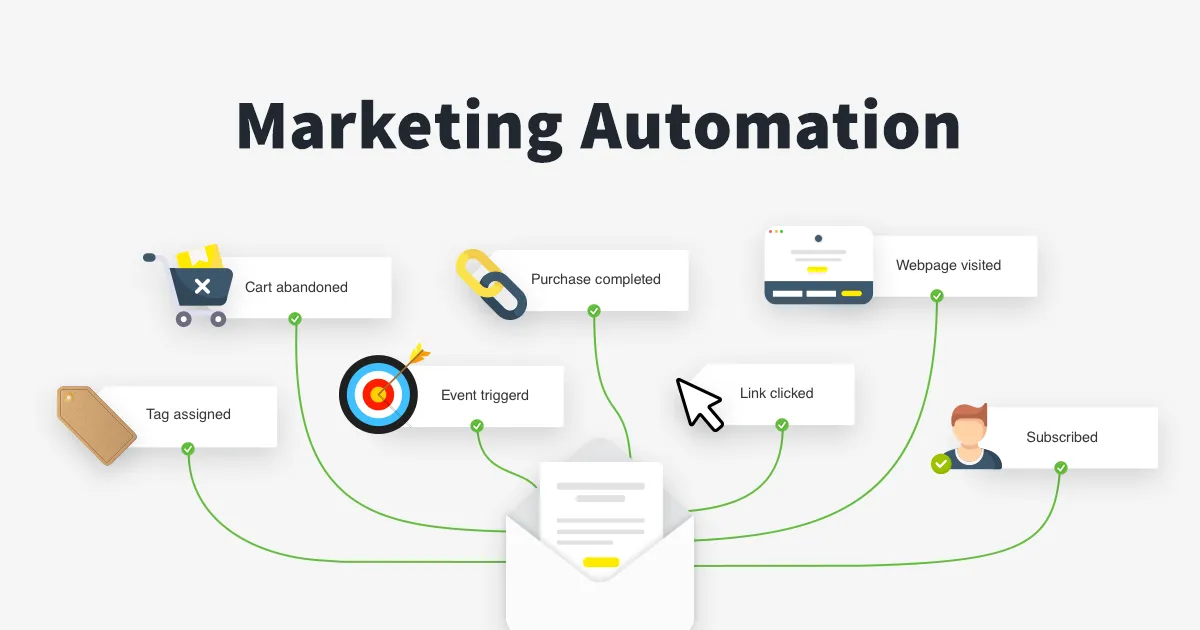
Marketing automation software streamlines your marketing tasks and helps you nurture prospects with personalized content. Think of it as your marketing assistant that never sleeps. Here's what these tools typically handle:
Email Marketing: Automated email sequences based on what people do on your website or how they interact with your brand. This includes welcome emails, cart abandonment reminders, and re-engagement campaigns.
Lead Management: Tracking and scoring leads so your sales team knows who to call first. The software watches how prospects engage with your content and assigns scores accordingly.
Customer Segmentation: Scheduling posts, monitoring mentions, and engaging with followers across multiple platforms from one dashboard.
Analytics: Tracking how your campaigns perform and measuring your return on investment across all marketing channels.
Top 10 Marketing Automation Tools
The marketing automation space is more competitive than ever in 2025. Platforms are adding AI features, improving user interfaces, and finding new ways to help businesses grow. Here are the top tools leading the charge.
1HubSpot Marketing Hub

HubSpot shines with its user-friendly interface and powerful features. You get advanced lead scoring, CRM integration, landing page builders, social media tools, and detailed analytics. Their Smart Content feature personalizes your website and emails based on who's viewing them.
Pros
- Easy-to-use interface suitable for beginners
- Offers powerful workflow automation
- Integrates well with CRM
- Provides detailed segmentation and personalization
Cons
- The price is expensive
- The free level has limited automation features
- Limited flexibility in automation triggers and conditions
Pricing: Offer a free basic plan, with paid tiers starting at $45/month (Starter), $800/month (Professional), and $3,600/month (Enterprise).
2ActiveCampaign
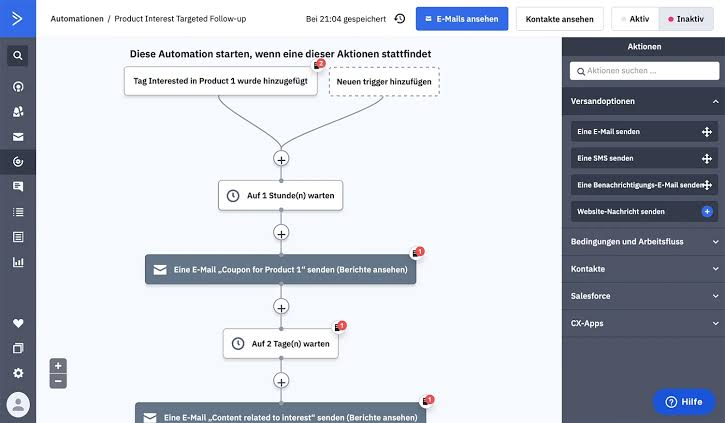
ActiveCampaign is the most powerful newsletter service for automations, especially if email marketing is your primary focus. It combines email marketing, automation, sales tools, and CRM in one platform.
Pros
- Excellent email deliverability
- Advanced automation and behavioral tracking
- 870+ integrations available
- Strong customer journey mapping
Cons
- Interface can overwhelm beginners
- Limited social media features
- Learning curve for advanced features
Pricing: Starting at $29/month (Lite), with higher tiers at $49/month (Plus), $149/month (Professional), and $279/month (Enterprise).
3Mailchimp
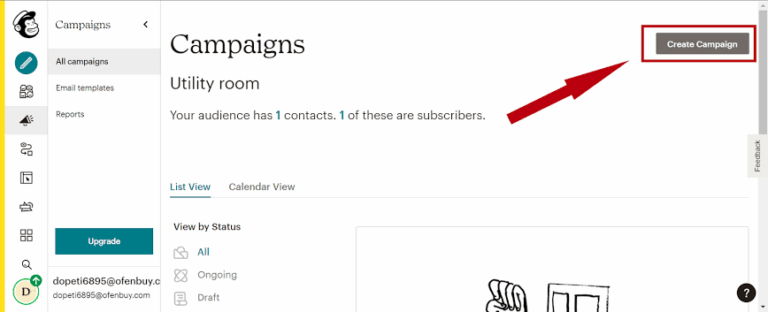
Mailchimp started as an email marketing tool but has grown into a full marketing platform. It's still the go-to choice for small businesses because it's easy to use and offers a generous free plan.
Pros
- Easy to set up automated email workflows
- Generous free plan
- Good selection of pre-built templates and journey automation paths
- Integrates well with many tools
Cons
- Limited automation compared to specialized tools
- Pricing increases quickly as your list grows
- Customer support can be hit-or-miss
Pricing: Offer a free plan for up to 2,000 contacts, with paid tiers at $10/month (Essentials), $15/month (Standard), and $300/month (Premium).
4Mautic
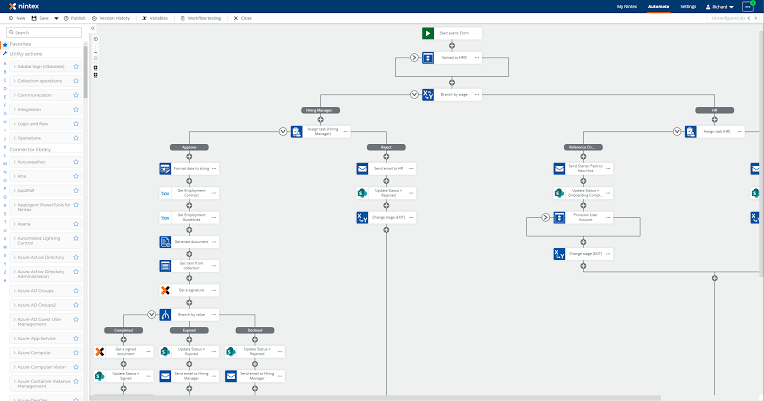
Mautic is the leading open-source marketing automation platform. It offers enterprise-level features without the licensing costs, making it perfect for tech-savvy businesses that want complete control.
Pros
- No licensing fees or contact limits
- Complete customization control
- Strong community support
- Self-hosted option for data control
Cons
- Requires technical expertise
- Limited official support
- Hosting costs add up
Pricing: Include a free open-source version (with hosting costs), a $150/month Cloud plan, and custom pricing for Enterprise.
5Odoo Marketing Automation
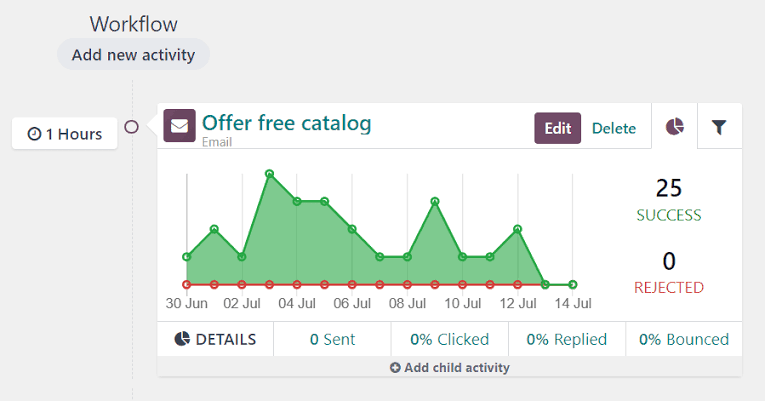
Odoo Marketing Automation is part of the comprehensive Odoo business management suite, making it an attractive option for companies already using Odoo for other business functions like CRM, accounting, or inventory management.
Pros
- Seamless integration with other Odoo apps
- Unified database across all business
- Customizable to specific needs
- Open-source foundation with commercial options
Cons
- Best suited for existing Odoo users
- Limited third-party integrations
- May require technical expertise
Pricing: Offer a free plan with basic features for unlimited users, $24.90/user/month for the Standard plan, and custom pricing for Enterprise.
6Ortto
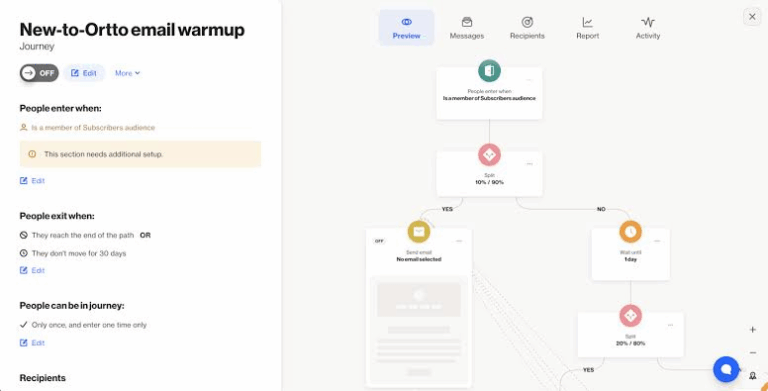
Ortto (formerly Autopilot) positions itself as a customer data and marketing automation platform designed for businesses that prioritize data-driven marketing strategies.
Pros
- Competitive pricing
- Excellent multi-channel campaign management
- Intuitive visual automation builder
- Strong focus on customer journey optimization
Cons
- Smaller market presence
- Limited third-party integrations
- Limited learning resources and community support
Pricing: Start with a free Build plan for up to 100 contacts, followed by $99/month (Launch), $299/month (Optimize), and custom pricing for the Scale plan.
7Salesforce Marketing Cloud
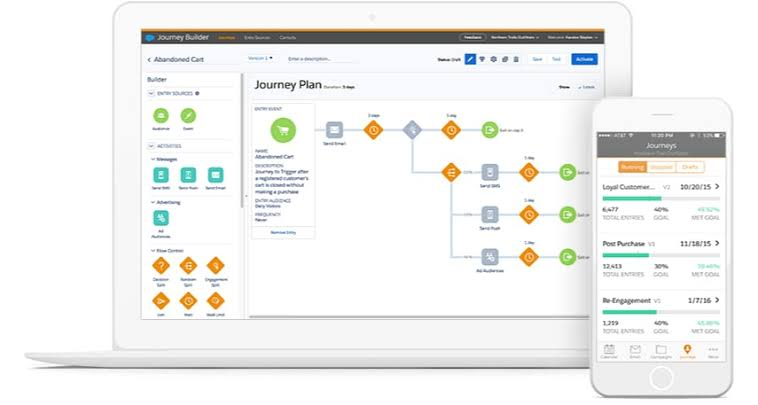
Salesforce Marketing Cloud is the enterprise solution for large organizations with complex marketing needs. It handles massive scales of data and campaign complexity with ease.
Pros
- Enterprise-grade scalability
- Advanced AI capabilities
- Intuitive visual automation builder
- Deep Salesforce integration
- Comprehensive multi-channel features
Cons
- Very expensive and complex
- Long implementation time
- Steep learning curve
Pricing: Start at $1,250/month per module, with custom enterprise plans available.
8Brevo
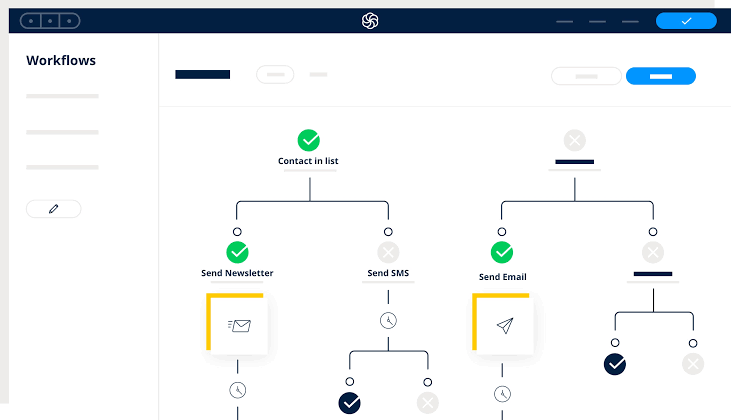
Brevo (formerly Sendinblue) positions itself as an all-in-one digital marketing platform that combines email marketing, SMS marketing, chat, CRM, and marketing automation in an affordable, user-friendly package. Brevo's strength lies in its multi-channel approach and competitive pricing structure.
Pros
- Excellent email deliverability rates
- Affordable pricing with free tier
- Multi-channel approach including SMS and chat
- User-friendly interface
- Built-in CRM functionality
Cons
- Automation features are less advanced
- Limited customization options
- Customer support response times can vary
Pricing: Offer a free plan for up to 300 emails/day, with paid tiers at $25/month (Starter), $65/month (Business), and custom pricing for Enterprise.
9Klaviyo
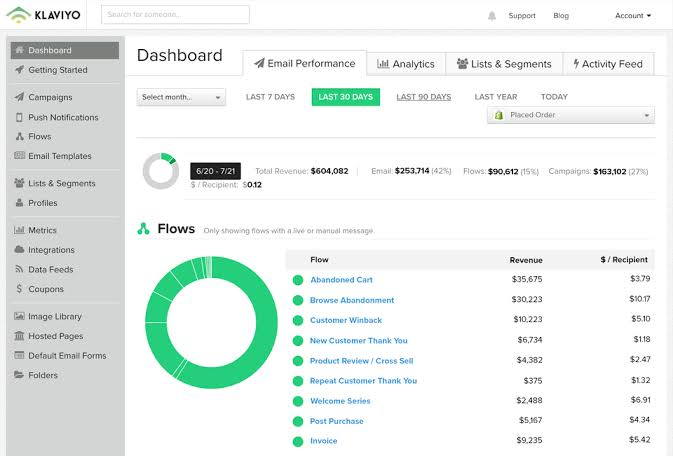
Klaviyo has established itself as the leading marketing automation platform specifically designed for e-commerce businesses. The platform excels at leveraging customer data and purchase behavior to create highly targeted, revenue-driving email and SMS campaigns.
Pros
- Strong revenue attribution and ROI tracking
- Advanced segmentation and personalization
- Exceptional e-commerce focus
- Sophisticated predictive analytics
- Comprehensive reporting
Cons
- Primarily designed for e-commerce
- Steep learning curve
- Can be expensive as contact lists grow
Pricing: Provide a free plan for up to 250 contacts and 500 emails, with paid plans starting at $20/month (Email) and $35/month (Email & SMS), plus custom pricing for high-volume senders.
10Marketo (Adobe)
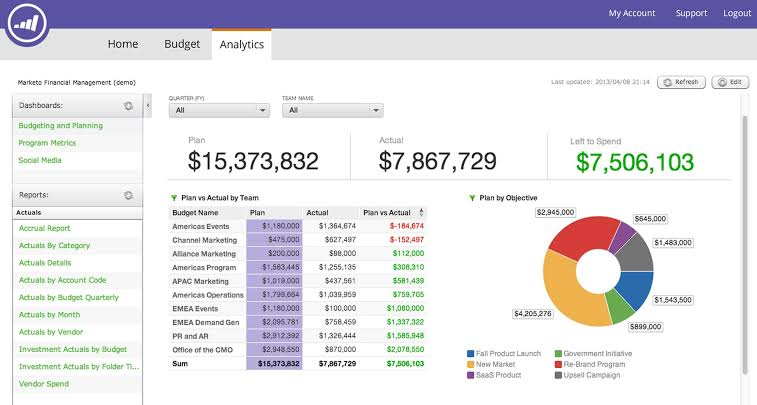
Adobe Marketo Engage represents the premium end of marketing automation, designed for large enterprises with complex marketing needs and substantial budgets. The platform excels in account-based marketing (ABM), lead management, and revenue attribution, making it particularly valuable for B2B organizations with long sales cycles and multiple stakeholders.
Pros
- Enterprise-grade functionality and scalability
- Advanced account-based marketing capabilities
- Sophisticated lead scoring and nurturing features
- Excellent integration with sales tools and CRM systems
Cons
- High cost and complexity
- Steep learning curve
- Long implementation and setup timeline
Pricing: Plans start at $1,195/month (Growth), with higher tiers at $2,295/month (Select), $3,595/month (Prime), and $5,995/month (Ultimate) for full enterprise capabilities.
How to Choose the Right Marketing Automation Tool?
Selecting the right marketing automation software requires careful consideration of multiple factors that align with your business goals, technical capabilities, and growth trajectory. The decision impacts not only your immediate marketing effectiveness but also your ability to scale and adapt to changing market conditions.
Clarify Goals & KPIs
Start by defining specific, measurable objectives for your marketing automation initiative. Are you primarily focused on lead generation and nurturing, customer retention and upselling, or revenue attribution and ROI optimization? Different platforms excel in different areas, so understanding your primary use case helps narrow the field. Consider both current needs and future goals, as switching platforms can be costly and time-consuming.
Budget vs. Expected ROI
Marketing automation pricing models vary significantly, from free tiers to enterprise solutions costing thousands monthly. Consider the total cost of ownership, including setup, training, integrations, and ongoing management. For open-source solutions like Mautic, factor in hosting costs, development time, and technical support requirements.
Integration Ecosystem
Evaluate how well each platform integrates with your existing technology stack, including CRM systems, e-commerce platforms, content management systems, and analytics tools. Seamless data flow between systems is crucial for creating comprehensive customer profiles and attribution reporting.
Team Size & Technical Depth
Assess your team's technical capabilities and available time for platform management. User-friendly platforms like Mailchimp or HubSpot require minimal technical expertise, while solutions like Mautic or Marketo may need dedicated administrators or external consultants.
Trial, Community & Vendor Support
Take advantage of free trials, demos, and pilot programs to test platforms with real data and use cases. Most vendors offer 14-30 day trials that provide insight into user experience, feature functionality, and integration capabilities.
Conclusion
Choosing the best marketing automation tool is crucial for your business success. The platforms we've reviewed offer different strengths for different needs—from HubSpot's all-in-one approach to Klaviyo's e-commerce focus. The best platform is the one that fits your specific needs, integrates with your existing tools, and grows with your business.
Choose wisely, test thoroughly, and remember that the right marketing automation platform can transform your business for years to come.






Leave a Reply.